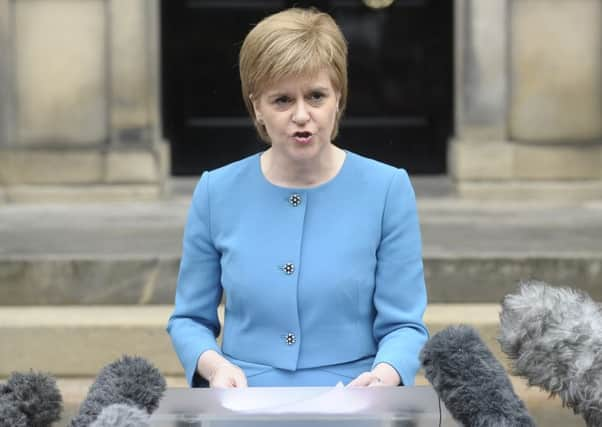Leaders: Economy holds key to second referendum


First Minister Nicola Sturgeon is leaving no stone unturned in her quest for a second referendum on Scottish independence. The UK-wide vote to leave the EU while Scotland voted convincingly in favour of Remain provides the SNP with the rationale to renew the pressure for Scotland to have a second vote.
While this issue may have been considered settled two years ago, the First Minister’s argument is that political conditions have now changed materially. As it is, the sharp division in voting between opinion in Scotland and the rest of the UK underlines the argument that Scotland is clearly different, culturally and politically from her southern neighbours.
Advertisement
Hide AdAdvertisement
Hide AdMs Sturgeon has taken her case to EU leaders in Brussels, stating her determination that Scotland should remain a member. However, it was made clear that there is little possibility of Scotland gaining any special status or relationship with the EU unless and until there is a vote for independence.
Campaigners for a second Scottish referendum will now be drawing sustenance from remarks by Scottish Conservative leader Ruth Davidson that such a referendum should not be blocked by the UK government. However, while this may further encourage the First Minister, the issue of timing remains a major consideration.
Ms Sturgeon is understandably reluctant to proceed unless confident of victory. While opinion polls taken in the immediate aftermath of the EU referendum showed a majority favouring independence, this needs to be sustained beyond the first flush of anger over the UK-wide EU vote.
A firm understanding would also need to be in place that victory in a second independence referendum would open the doors to a Scottish application for EU membership. While many in Scotland and in the diplomatic corridors of the EU may wish such an application every success, a close eye would almost certainly be cast over Scotland’s financial position and its suitability as a candidate for membership of the euro – agreement to which would be a condition.
The problem here is that Scotland’s fiscal position has notably weakened since the 2013 referendum following the collapse in world oil prices. This had a serious impact on North Sea oil and gas revenues, which have plunged from expectations of £6.8-£7.9 billion this year to just £0.5-£2.8 billion.
As matters stand, Scotland’s budget deficit as a percentage of GDP is more than three times that of the UK. That will be concern both to Scottish voters and the European Central Bank and EU budget overlords already having to contend with unsustainable budget deficits within the eurozone. There is every possibility that to qualify for EU membership the outcome for Scotland could be more austerity, not less.
All this may barely figure in the First Minister’s current endeavours to give force to Scottish voters’ evident wishes to be part of the EU. But it will become a cardinal factor in her calculations over the timing of that second independence vote.
The price of school holidays
What an obedient, rule-observing country we are, it seems: as school holidays begin, a UK-wide survey today shows Scottish parents are least likely to take their children out of school during term-time claiming that they are ill.
Advertisement
Hide AdAdvertisement
Hide AdBut little wonder the incidence of playing truant has soared UK-wide: the greater the premium that hotels and holiday firms charge during official school holiday periods – and the mark-up can be eye-wateringly large – the greater the temptation for parents to take holidays before the end of term.
The survey finds parents in the Midlands, London, the north-east of England, Northern Ireland, Wales and East Anglia were most likely to have taken their children on holiday during term time claiming they were ill, even though parents in England face fines of £60 per child for unauthorised absences.
In Scotland, pupils can be taken during term-time only in exceptional circumstances, such as a parent being in the armed services or to allow a family to recover from distress.
But the rate of “holiday truancy” is lower in Scotland than in any other part of the UK. Scottish government figures show that only around 0.5 per cent of days were lost to unauthorised holiday absences in 2014-15.
It would be heartening to think that Scots parents are deserving of a merit button, but the explanation may lie in the fact that in Scotland the summer school terms finish around the end of June, a fortnight earlier than in England and Wales. This means parents can take advantage of cheaper holidays at the beginning of July.
And that difference can save parents hundreds of pounds on their annual family holiday. A case, surely, of Vive la difference!